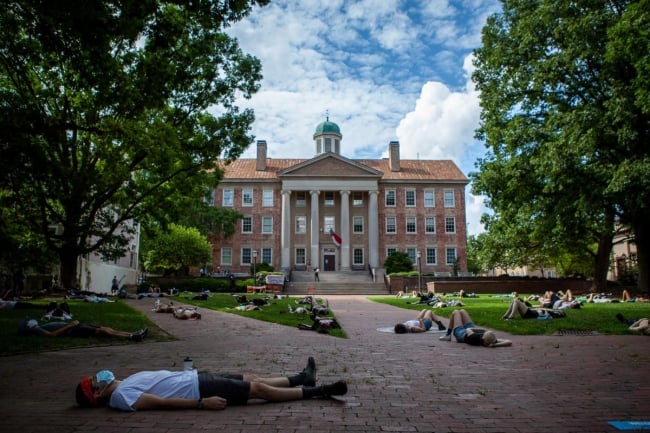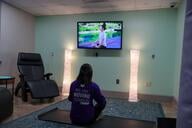You have /5 articles left.
Sign up for a free account or log in.

Staff and students at UNC Chapel Hill participate in a "die-in" to protest campus reopening.
Dakota Moyer/Chapelboro.com
With classes at the University of North Carolina at Chapel Hill due to begin Monday and many students already moving back to campus, pressure on UNC administrators to delay the start of in-person instruction or adopt virtual learning for the fall is mounting -- including from local officials.
The director of the health department in Orange County, which contains Chapel Hill, urged UNC chancellor Kevin Guskiewicz in a memorandum last week to restrict on-campus housing to students with significant need and to “consider virtual classes for the fall semester but at minimum begin the first 5 weeks of the semester with online instruction only.”
Quintana Stewart, health director for the county, cited a range of statistics and circumstances about the current COVID-19 situation within the county, especially noting concerns about the safety of public transportation and constraints on testing and contact tracing.
Beyond those health concerns, she wrote in a memo that local newspapers published Monday, “I have received a massive amount of emails from community members, UNC staff, faculty and students sharing their concern for fully reopening campus for the Fall Semester. If students begin to move back on campus next week, we could quickly become a hot spot for new cases as thousands of students from all across the country/world merge onto the UNC Campus and begin [to] interact in a manner very normal for college students in a congregate setting.”
Delaying the start of on-campus instruction would, she added, “allow the university, the Orange County Health Department, and the UNC Healthcare system more time to monitor the spread of this virus and prepare for any unanticipated campus impact.”
Thanks, but no, Guskiewicz essentially wrote in a response posted to UNC’s website Wednesday night.
“I took their recommendations very seriously and convened a meeting … of our infectious disease and public health experts” and senior university leaders, the chancellor wrote. He said administrators had decided to reduce UNC’s on-campus residential capacity to 64 percent of normal, further limited classroom capacity to 30 percent through more use of hybrid courses, and had taken steps to increase testing and safe transportation options.
In discussions with Quintana and other county officials, Guskiewicz said he “reiterated that we believe we are well prepared for the start of the fall semester and we will continue to track trends that could lead us to recommend a modification to our plans. Soon after, I discussed this matter with the UNC System and we were advised by the UNC System to stay the course with our current plan.”
The University of North Carolina system office has asserted its authority over decisions about whether its 17 campuses should physically reopen this fall.
County health officials are far from alone in believing that Chapel Hill, at least, is on the wrong course. Wednesday evening, dozens of students and employees held a protest they referred to as a "die-in" on the Chapel Hill campus (see photo at top), Chapelboro.com reported.
“We know that there will be an outbreak on campus,” the publication quoted Lindsay Ayling, a doctoral student in history, as saying. “Campus workers will get sick and some of them will die. Students, community members, faculty, and staff all will get sick and potentially die.”
She and other speakers said conditions on campuses like UNC's were "set up to spread a pandemic," as Ayling put it, even if students behave.
But you didn't have to look far for evidence that not all students at UNC would behave. A video circulated this week of what appeared to be dozens of young women leaving what one television news report said was a sorority rush party at an off-campus home. There were no masks in sight.
-- Doug Lederman
Syracuse University temporarily suspended a group of students for “knowingly violating” New York state’s quarantine mandate for travelers arriving from a specific list of states, Sarah Scalese, senior associate vice president for communications, said in an emailed statement.
Scalese declined to comment on how many students were suspended or for how long. Syracuse began welcoming first-year students to residence halls on Aug. 2, and some are quarantining off campus, Syracuse.com reported. Some students signed the university’s Stay Safe Pledge, which included an agreement to “follow any new directives” from federal and state authorities and said failure to comply could result in a conduct violation.
“Creating a safe campus environment is all of our responsibility, and Syracuse University will not tolerate any actions -- on the part of students, faculty, or staff -- that jeopardize the health of our community,” Scalese’s statement said. “Our ability to resume residential learning is very much dependent on our community’s behavior and willingness to adhere to public health guidelines.”
-- Greta Anderson
Johns Hopkins University and the University of Massachusetts at Amherst were among the latest institutions Thursday to rethink their plans for the fall.
"We write today with a profound sense of regret and intense disappointment to share the news that we will not be able to return in person to campus this fall as we had hoped," Johns Hopkins president, provost and vice president for student affairs wrote to undergraduates late Thursday. "With the full support of the board of trustees, we have come to the difficult but necessary decision that the fall semester will be entirely online for our undergraduates."
The administrators "strongly" urged students who had planned to come to Baltimore for the fall "not to do so," said virtually all campus facilities would be closed, and announced a 10 percent reduction in fall tuition.
UMass-Amherst had already planned to offer most courses virtually this fall, but went a significant step further Thursday evening by announcing that only students enrolled in "essential face-to-face classes, including laboratory, studio and capstone courses" would be permitted to live on the campus.
"All other students, whose courses do not require a physical presence on campus, should plan to engage in their studies remotely, from home. In the interest of public health, we also strongly urge our off-campus students whose coursework is remote to refrain from returning to the Amherst area for the fall semester, for they, too, will not have campus facilities at their disposal," Chancellor Kumble R. Subbaswamy wrote..
Several more colleges announced that they would either teach virtually throughout the fall semester or delay the start of in-person classes and students' return to the physical campus.
Announcing moves to fully online instruction for the fall were Loyola University Maryland, Oglethorpe University in Georgia and Wilson College in Pennsylvania.
Those saying they would start the semester fully online, but with the hope of bringing meaningful numbers of students back to campus for in-person courses, included Capital University in Ohio (through at least Sept. 21), New Jersey's Seton Hall University and the University of Southern California.





